Cuba is working with the Dominican Republic Marine Studies Foundation and The Nature Conservancy (TNC) to implement the CoralCarib project, a regional initiative aimed at restoring and preserving coral reefs in the Caribbean.
This project spans six years and has a budget of 10.8 million euros, which is provided by the German government through the International Initiative for Climate Protection.
According to Francisco Núñez, the TNC’s representative for Central America, CoralCarib seeks to restore marine biodiversity in 1,871 hectares of crucial coral reefs in the Dominican Republic, Jamaica, Haiti, and the Cuban archipelago, where the majority of these reefs are located.
Historical temperature patterns and future forecasts, data on the effects of hurricanes, and the interconnectedness of coral reefs, as well as the establishment of climate-friendly habitats, are all employed to safeguard the ecosystem.
Núñez emphasized that this is a crucial mission in the face of climate change, which poses a risk not only to the oceans but also to the economic stability and the prosperity of communities in the Caribbean.
In the case of Cuba, the project is focused on the Ciénaga de Zapata National Park and the coasts of the National Aquarium, in the evaluation of coral biomass due to its dramatic reduction in the region.
Based on these investigations, experts are currently working on restoration efforts with more resilient species, employing techniques such as cloning coral fragments.
They are also employing contemporary methods, including gamete retrieval and sexual fertilization, to facilitate assisted sexual reproduction and the establishment of agricultural operations for direct seeding on the reefs.


